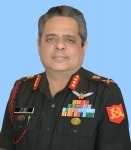| #954 | 1374 | January 11, 2013 | By Lt Gen Raj Shukla, YSM, SM | |||||
|
In a recent article ( 03 Dec 2012 ) for the Carnegie Endowment for International Peace, entitled “ India’s Predicaments and its Grand Strategy,” Ashley J. Tellis recounts as to how Indian foreign policy has successfully navigated the international system through the six decades since independence. In doing so, the writer outlines the contours of India’s ‘grand strategy’ and recalls her success in surviving as a unified entity despite great poverty and diversity, rubbishing in the process Winston Churchill’s grandiose assertion that India was nothing more than a geographical term ; he also points to the nation’s courageous feat of preserving its strategic autonomy in the face of substantial material weakness. The article also helps to revive an old debate about ‘grand strategy,’ which is significant because discussing ‘grand strategy’ is arduous business in India where in the view of some of its leading lights (Ramachandra Guha and Sunil Khilnani) the very thought is mimetic of western responses and defiles the Indian genius. So while we may not articulate a ‘grand strategy,’ we will do well to pursue one - in a pragmatic, understated and commonsensical manner. After all, China talks of ‘a peaceful rise’ but packs it with the punch of an annual defence budget of 180 billion dollars and a prescient military modernization programme which some analysts describe as the most massive in the history of mankind ; one that is set in precise timelines and choreographed with deft politico-military signaling of intent and capability through a series of Defence White Papers and periodic military manouveres. Whatever course we adopt, here are a few random thoughts, which may help to flag some criticalities in our emerging worldview / strategic outlook / grand strategy. In the course of the article, Mr Tellis seems to attribute to India’s foreign policy a certain sagacity that is debatable - most visible in his analysis of India’s view of itself and the three constants that in the writer’s view define India’s relationship with the world. There is need for sombre reflection and course correction here, if To turn to the subject of strategic autonomy, we will do well to remember that the successful pursuit of such an objective is not only about steering clear of rival camps but also about the astute practice of strategic creativity to adjust to a changing international order in accordance with the national interest ; it is not only about shunning cavorting alliance seekers but also about embracing them when our needs so dictate. While Ashley surmises that India’s Grand Strategy is what it is because of its decided introspective tenor that in turn drives the transformation of its political, economic and social management. In the years to come, however, India’s Grand Strategy will have to undergo dramatic introspection and transformation - principally in the domain of appropriate leveraging of instruments of force and the military dynamic - then and only then, will our Grand Strategy become wholesome enough to be able to navigate through the challenges and predicaments of the future. Ashley Tellis through his fulsome compliments has been kind ; we must not however delude ourselves into believing that
Views expressed are personal.
| ||||||||
| ||||||||

|
Lt Gen Raj Shukla, YSM, SM |


